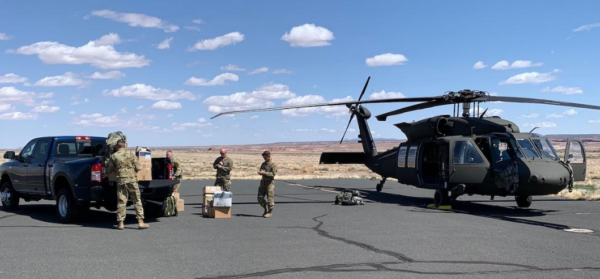
- Details
- By Native News Online Staff
WINDOW ROCK, Ariz. — The president of Navajo Nation on Thursday joined a growing number of tribal leaders voicing opposition to a decision that allows Alaskan Native Corporations (ANCs) to receive a portion of the $8 billion set aside for tribes in the recent COVID-19 relief package.
The growing opposition comes after the U.S. Department of Treasury decided earlier this week, after consulting with the Department of Interior, that shareholder-owned ANCs would be eligible to apply for some of the billions earmarked for tribes in the Coronavirus Aid, Relief, And Economic Security (CARES) Act.
The decision has stirred emotions across Indian Country, as tribal leaders in the lower 48 states called on the Treasury Dept. and DOI to ensure that funds be directed to tribal governments, including Alaskan villages, but not the privately held ANCs.
A group of tribal chairman from the Great Plains called for Asst. Secretary Tara Sweeney to be removed from her post at the Indian Affairs, while other tribal leaders and Native American advocates peppered the Treasury Dept. and DOI with letters opposing the decision. One tribe threatened to sue the federal government to halt the funding process.
Yesterday, an Alaska tribal leader joined the loudening chorus. Michael Williams, Sr., chief of The Akiak Native Community in Alaska, wrote in letter to Treasury Secretary Steven T. Mnuchin and Sweeney that he opposed the award of any portion of the CARES relief funding to private for-profit corporations, noting: “The whole point of the fund (is) to cover public services provided by governments, not to make payments to private companies.”
Then earlier today, the president of Navajo Nation, which has become the epicenter of the COVID-19 outbreak in Indian Country, decried the decision and demanded answers from the DOI and Treasury Dept.
“Alaska Native Corporations are for-profit entities that have billions of dollars in revenue, and can access other funding sources in the CARES Act. The Congressional intent of these funds were to relieve tribal governments. We need to provide relief for our tribal communities, not shareholders,” President Jonathan Nez said in a statement.
“We demand answers from the Department of the Interior and the Department of the Treasury on how they are upholding their trust responsibility to federally-recognized tribes by considering this action. The $8 billion tribal set-aside should provide much-needed relief to tribes, not for-profit corporations. These for-profit corporations will take away resources from tribes,” Nez said.
“We, along with other federally-recognized tribes, aggressively advocated for tribal funding to be included in the CARES Act and now we must continue fighting to keep what was allocated for us,” Nez said.
Navajo Nation is the largest tribe in Indian Country and has been hit the hardest by the COVID-19 outbreak, with close to 1,000 confirmed cases and 38 deaths. Navajo Area Indian Health Service has indicated that it anticipates the number of COVID-19 cases to peak in mid-May.
If the projections are accurate, Navajo Nation has “a long way to go” in terms of providing health care treatment, hospital beds, ventilators and other essential items.
“Our Nation is slowly seeing the benefits of the three COVID-19 bills passed by Congress, but it is not arriving fast enough. We need more rapid testing, health care personnel, PPE’s, ventilators, and other essential services to adequately address the expected increase of COVID-19 cases on the Navajo Nation,” vice president Myron Lizer said in a statement.
In the meantime, Navajo Nation has stepped up its activity and is “praying for the best, and preparing for the worst,” Nez said.
“We are not sitting back waiting for the federal government,” Nez said. “We are stepping up with our own funds and resources, and with partnerships with outside entities, to provide for our Navajo people and communities. We strongly urge the Department of the Interior and the Department of the Treasury to re-evaluate their position and do what is right for all tribes,” Nez said.
“Funds need to be prioritized for federally-recognized tribes, not corporations,” Lizer added.
Acknowledging that ANCs are probably experiencing financial difficulties as a result of COVID-19, Williams, the Alaskan tribal chief, wrote: “Congress may have a special duty to assist (ANCs) at some point. But that discussion is for another day.”
Tribal Leaders Call for Asst. Secretary Tara Sweeney’s Removal from Indian Affairs Post
More Stories Like This
Native News Weekly (August 25, 2024): D.C. BriefsNavajo Nation Gaming Enterprise Marks Problem Gambling Awareness Month With $3.4M in Support
Cheyenne River Youth Project to Celebrate Women’s Strength at Barbie-Themed Passion for Fashion on March 14
Celebrating Native American Women
Native Bidaské: The Illusion of Freedom and the Myth of America 250, Leonard Peltier Speaks Out
Help us defend tribal sovereignty.
At Native News Online, our mission is rooted in telling the stories that strengthen sovereignty and uplift Indigenous voices — not just at year’s end, but every single day.
Because of your generosity last year, we were able to keep our reporters on the ground in tribal communities, at national gatherings and in the halls of Congress — covering the issues that matter most to Indian Country: sovereignty, culture, education, health and economic opportunity.
That support sustained us through a tough year in 2025. Now, as we look to the year ahead, we need your help right now to ensure warrior journalism remains strong — reporting that defends tribal sovereignty, amplifies Native truth, and holds power accountable.
 The stakes couldn't be higher. Your support keeps Native voices heard, Native stories told and Native sovereignty defended.
The stakes couldn't be higher. Your support keeps Native voices heard, Native stories told and Native sovereignty defended.
Stand with Warrior Journalism today.
Levi Rickert (Potawatomi), Editor & Publisher

